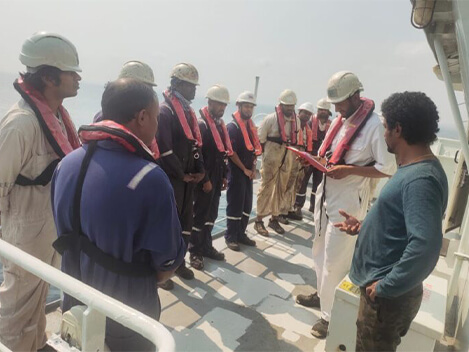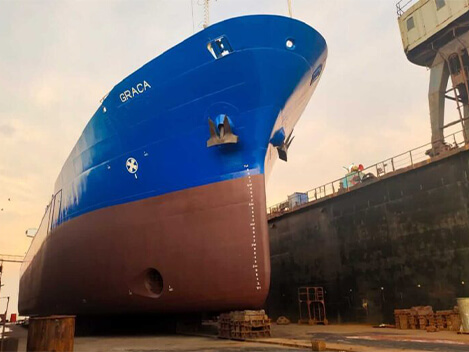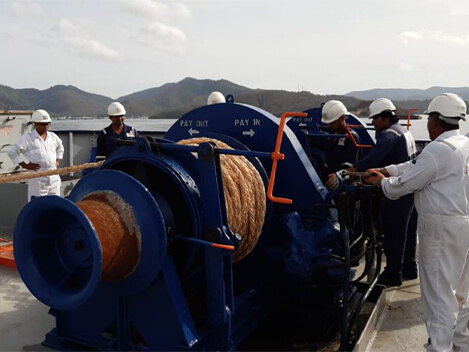Maritime Service
- Experience the difference with our comprehensive maritime services
Ship management involves the operation and maintenance of a vessel, including tasks such as crewing, procurement of supplies, and management of technical and safety systems.
It is a critical function in the shipping industry, as it ensures the safety and efficiency of vessels and helps to ensure compliance with relevant laws and regulations.
Ship management companies offer a range of services, including technical management, crew management, and commercial management.

Crew management is a key aspect of ship management, responsible for the recruitment, training, and deployment of crew members on ships and other vessels.
This includes tasks such as selecting and hiring crew members, managing payroll and benefits, and ensuring compliance with relevant laws and regulations. Crew management companies typically work with shipping companies and ship owners to provide qualified and experienced crew members for a variety of vessels, including cargo ships, passenger ships, and offshore oil and gas platforms.
Effective crew management is essential for the safety and efficiency of vessels, as well as for the well-being and satisfaction of crew members.

Offshore services – activities related to the exploration, development, and production of offshore oil and gas reserves.
These services may include tasks such as drilling, well maintenance, construction and installation, and logistics support.
Offshore services are provided by specialized companies and contractors working in the energy industry, and often involve the use of specialized equipment and technologies.

Ship repair and maintenance refers is a process of repairing, maintaining, and upgrading ships and other vessels. This can include tasks such as hull cleaning, painting, and repairs to engines, electrical systems, and other equipment.
Ship repair and maintenance is essential for ensuring the safety and efficiency of vessels, as well as for maintaining compliance with relevant laws and regulations. Ship repair and maintenance services provided by ASMS Shipmanagement company or shipyards, as well as by in-house maintenance teams on board vessels.

Asms Ship Management – Ship chandler that provide supplies and equipment to ships and other vessels. These supplies may include food, fuel, and other provisions needed for the operation of the vessel, as well as technical equipment and spare parts. Ship chandlers may work with a variety of different vessels, including cargo ships, passenger ships, and offshore oil and gas platforms.
They may also provide services such as procurement, storage, and delivery of supplies to vessels, as well as the management of inventory and stock levels. Overall, ship chandlers play a critical role in the smooth operation of the shipping industry by ensuring that vessels have the supplies and equipment they need to function safely and efficiently.

Asms Ship Management, ship agent is individual that represents ship owners or operators in the handling of vessel-related activities at a port or other location. Ship agents are responsible for coordinating the various services and supplies needed by a vessel while it is in port, such as bunkering, cargo handling, and crew changes.
They may also be responsible for handling customs and immigration formalities, and assisting with the coordination of repairs and maintenance. Ship agents may work with a variety of different vessels, including cargo ships, passenger ships, and offshore support vessels. Overall, ship agents play a crucial role in facilitating the smooth operation of the shipping industry by ensuring that vessels receive the support and services they need while in port.

P&I (Protection and Indemnity) insurance covers the legal liabilities of ship owners and operators, including third-party claims for personal injury, property damage, and pollution. H&M (Hull and Machinery) insurance covers the physical damage to a vessel and its equipment. These types of insurance are important for protecting against the financial risks and liabilities associated with the operation of vessels.

Dry docking is the process of removing a vessel from the water for repairs and maintenance. Reactivation is the process of returning a vessel to service after it has been inactive. Both processes are important for maintaining the safety and efficiency of vessels and ensuring compliance with relevant laws and regulations.

Ship classification is the process of inspecting and certifying ships to ensure they meet certain standards of safety and construction. Ship documentation is the process of registering a vessel and obtaining necessary documents and certificates for its operation. Both processes are important for ensuring the safety and compliance of vessels and facilitating the smooth operation of the shipping industry.
